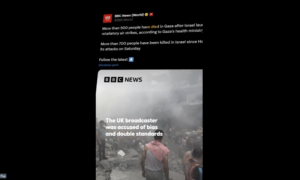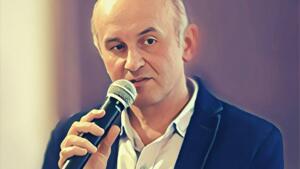“We feel guilty towards Jews for anti-Semitism and the Holocaust. This is a valid remorse. It is a pity that in the context of the situation in Israel and Palestine, we are trying to atone for the crimes of the past while ignoring the ones being committed today” – says editor-in-chief of the Polish edition of Le Monde diplomatique
Katarzyna Makarowicz: You write on your Facebook that “observers quoted by large media admit that they cannot give reason for the situation [in Israel and Palestine]. Honestly, it’s hard to understand this helplessness. After all, it is no secret that the Gaza Strip (…) has been under Israeli siege for the last 16 years.” Are you suggesting that we should have expected an attack from Hamas?
Przemysław Wielgosz: Yes, over the last 16 years Israel has attacked Gaza many times. It was only a matter of time before Hamas acquired sufficient resources to respond to these attacks. Since 2007, Israeli troops have been bombing and invading the Gaza Strip every few years, and these were de facto unilateral actions. Now, for a brief moment, the roles were reversed. One can, of course, explain the surprise of commentators with the assumption that the power structures and armed forces in Gaza have been so destroyed that an attack could not happen. But the tens of thousands of bombs that have been dropped on the Gaza Strip in recent years have apparently not been enough to completely pacify the area and turn it into a depoliticized slum.
What has the situation been like in the recent months?
We could observe a reduction in military activities in the region. Gaza was last bombed in June. Dozens of people were killed during the two-day raids. Compared to 2020, when approx. 250 Palestinians lost their lives, or 2014 when approx. 2,000 Palestinians were killed during 52 days of bombing, this number might have gone unnoticed.
But that’s not all. In the West, we tend to separate what is happening in the Gaza Strip from what is happening in the occupied territories in the West Bank. Meanwhile, both have a huge impact on each other. And the situation in the West Bank is crucial here: it has been rapidly deteriorating in recent months. In July, Israel attacked Jenin, an important centre of Palestinian resistance during the Second Intifada, or Palestinian uprising. This attack was a symptom of the escalation of occupation violence in the Palestinian Authority.
What else is going on there?
Occupation violence is no longer monopolized by the Israeli military. For several years now, the number of incidents of violence by Israeli settlers, 600-700 thousand of whom reside in the occupied territories of Palestine, has been increasing, which in and of itself is a crime under international law. They are often members of various ultranationalist militias, sometimes of a religious nature. In 2023 alone, before the current phase of fighting around Gaza began, settlers carried out 736 attacks on the Palestinian population in the West Bank. During that time, the Israeli army used violence as many as 2,513 times.
Are the Israeli authorities responding to this in any way?
No, the army and police do not prevent them from committing pogroms like the one in the city of Huvara this year, where dozens of Palestinian shops, houses and cars were vandalized, and scores of people were injured. This is not the only massacre against the Palestinian population in recent years. Those are terrible images: people shooting with machine guns at farmers picking olives or at passerby, just like in Huwara.
The responsibility for this violence falls on the Israeli far-right, which feels unpunished and, as of recently, has its representatives in the government. Even if such people are brought to justice, they receive symbolic punishments. Moreover, Israel’s policy towards Palestine enjoys approval among the most important players in the international arena, including the United States, which supplies the budget of the occupation forces with $2-3 billion in non-repayable aid annually, which actually finances the occupation policy.
We will come back to Israel’s allies later. But let me ask you first: in the current situation, is Hamas the only political force that represents the interests of Palestinians?
You’d have to ask the Palestinians themselves. However, it is worth taking into account that this society does not have much choice in whom to entrust its interests. The traditional political forces of the Palestinian Authority only play the role of a ‘gendarme’, managing the occupied population, deprived of the possibility of resistance to Israel’s colonizing forces. Despite the Oslo Accords, the legal basis for the existence of the Authority from 1993, the authorities in Ramallah de facto control only 20% of the West Bank, and even there, have no authority over the airspace or their borders.
An additional difficulty is the location of the Authority. It is not a compact area that can be easily controlled. As a result of the progress of illegal Israeli colonization, the West Bank has become something of an archipelago of islets fenced by the occupier, sometimes cut off from the world by the wall built by Israel. Amnesty International calls the situation for which Israel is responsible apartheid. And by and by, much to the dissatisfaction of Israeli politicians, observers around the world are agreeing with this definition.
Support peace journalism, support Salam Lab >>>
For many years, the traditional groups associated with the Palestine Liberation Organization have been plagued by corruption, nepotism and collaborationist policies. Many Palestinians believe that Fatah, one of the dominant political and military parties and organizations, despite its national liberation rhetoric, is not at the head of society and does not represent its independence and freedom aspirations. That it exchanged these goals for positions in the administrative structures of the Authority in agreement with Israel. Moreover, these groups have no democratic legitimacy. The last, and so far the only, elections in the Authority were held in 2006, when Hamas won them, to which Fatah responded with a coup d’état supported by Israel. The only place where Hamas maintained power, also through violence, was the Gaza Strip. And this became the beginning of the Palestinian version of dual power, and also the beginning of the Gaza blockade.
Given the breakdown of Palestinian society, does Palestine have any chance of developing healthy state structures?
Potentially it has, because despite the siege of Gaza and the segmentation and isolation of Palestinian enclaves in a sea of Israeli settlements and military areas, it is a very politically conscious society. Palestinian men and women demonstrate attitudes of democratic self-organization typical of a civic society. And one of the symptoms of this awareness are resistance movements against the separation wall in the West Bank, such as in Bil’in and other towns threatened by the course of this barrier, as well as new initiatives gathering young people, e.g. in Jenin. Another example of the activities of Palestinian civil society is the BDS campaign – Boycott, Divestment, Sanctions – i.e. a call for 150 social organizations to boycott, withdraw investments and impose sanctions against Israel.
These uprisings do not fit into the political divisions that we know from analyses: Hamas on one side, Fatah on the other. Palestine has a long tradition of grassroots organizing. The first intifada, the 1987 uprising, relied largely on mass peacekeeping, strikes, and building horizontal structures of solidarity. These attitudes have not disappeared, although today the conditions for their development have been extremely limited. Nevertheless, even in the Gaza Strip, Palestinians are organizing to provide humanitarian aid and activate the local community. Neither the occupation nor the authoritarian rule of Hamas suppressed it.
Is there a chance, then, for Palestinians to fight for freedom differently than the way Hamas does?
Palestine’s response to Israeli colonization will depend, paradoxically, on Israel. Benjamin Netanyahu’s country has overwhelming military, economic, technological and political advantages, thanks to which it can impose an advanced system of apartheid on the occupied people with impunity.
The main problem here is illegal colonization and the accompanying displacements, which de facto deprive Palestinians not only of the right, but also of the material opportunities to obtain independence. After all, it is difficult to imagine a country that will consist of several dozen islands isolated from one another. Only Israel can change this situation. Either it will continue colonization indefinitely and expect further escalations of violence, or it will withdraw the settlers.
Benjamin Netanyahu co-governance with openly racist and fascist parties is not his only sin. After what he did in Gaza in 2014 and what he is doing there now, he deserves to be called a war criminal. It is unlikely for him to decide to withdraw from the occupied territories. He knows that such a decision would mean the end of his political career.
Who in Israel still benefits from the status quo?
Settlers and extreme militaristic circles promoting Israeli colonialism. That is, the social base for the current government. In recent years, Israel has been evolving into an increasingly controlling and militarized state, not only into an apartheid state for Palestinians, but also into an authoritarian state for Jewish citizens.
Let us talk about the reception of the events of recent days. Since we know that there is a total disproportion of forces here and the humanitarian situation in Gaza is tragic, why did the so-called Western world so easily support Israel’s actions?
This is a thoughtless and, worse still, traditional reaction. Even when Israeli officials or politicians threatened to use nuclear weapons in the Gaza Strip, the West did not shake off its lethargy.
Why is it the case?
Because geopolitics is more important than the human rights and democratic values that we formally proclaim. The Western world wants to have a geopolitical foothold in the region due to oil sources and communication routes. After 1967, the US established Israel as exactly such a bridgehead. This suited Israelis very well because it allowed them to legitimize their policy. But Israel is no exception. The West supports Arab dictatorships such as the bloody military regime in Egypt, the Wahhabi monarchy of Saudi Arabia, and the emirates of the Persian Gulf for the exact same reason. This strategy reveals the entire hypocrisy of Western policy. The West is eager to present itself as a depository of democratic values, but in fact it acts in accordance with its colonial legacy, its most disgusting ideologies and genocidal practices.
It is clear that we can oppose neo-colonialism and imperialism, but only when it is consistent with our geopolitical interests. When our political rival tramples on some rights, we are able to suddenly discover the meaning of the terms “imperialism” and “self-determination”, as happened in the case of Russia’s aggression against Ukraine and China’s repression against the Uyghurs. However, when the colonization policy manifests itself in the actions of our allies – not to mention our own governments – our sensitivity evaporates to such an extent that we are able to endure even words such as those used by the commander of the Israeli army a few days ago – that Israel “is fighting animals, so it must act accordingly.”
And all this was enough for the humanitarian situation in the Gaza Strip to no longer affect us?
Yes, if we add racism to the mix. In the Gaza Strip, people with skin colours other than white suffer. There is no other explanation why we are able to show solidarity and raise money to help the defenders of Mariupol, but we are unable to do it for the Gazans.
But there is one more thing stemming from the history. We feel guilty towards Jews for anti-Semitism and the Holocaust. This is a valid remorse and an issue that is still not fully resolved in Poland, because anti-Semitism is still a serious threat. It is a pity that in the context of the situation in Israel and Palestine, we are trying to atone for the crimes of the past while ignoring the ones being committed today.
Meanwhile, our attitude should be as follows: we do not agree to racist, xenophobic and colonial practices. No matter who uses them today. Even if it is Israel.
We see that our recipients have a great need to attribute moral superiority to one of the parties, Palestinian or Israeli. We understand this need, but is it even possible in this situation?
It’s a completely natural desire. There is no need to attribute any special features to the history of Palestine and Israel that would prevent it from being clearly understood. Considering it too complicated to judge is, in fact, a form of exoticizing the situation in the so-called Middle East. Presenting the entire region as some irrational melting pot full of fundamentalisms, cultural peculiarities, barbarism, and mindless hatred.
The war in Syria could be described in exactly the same way as too complex for Western judgment. There too, one can see a mosaic of different influences, religious organizations, political and ethnic elements so great that one could completely lose sight of one another. And yet public opinion in our country and around the world generally had no problem identifying who was responsible for what was happening there, right?
In occupied Palestine, there is only one aggressor, and the fact that the current cycle of violence was initiated by the Hamas attack does not change it. There is no symmetry between the state occupier and the resistance movement. Therefore, it is not the case that both sides are equally responsible for what is happening today. However, the possibility of identifying the occupier and the occupied does not mean that only one party is responsible for condemnable actions. Attacks on Gaza’s civilian population do not justify retaliatory attacks on civilians in the Israeli city of Sederot or elsewhere. In both cases, we are dealing with war crimes and conscious endangerment of their own populations.
Support peace journalism, support Salam Lab >>>
We have a tendency, further reinforced by pop culture stereotypes, to imagine that there are only good people on one side of the conflict and only bad people on the other. This is simplistic and untrue. Today, there are various Israeli-Palestinian initiatives that are breaking down this divide and trying to create the foundations for a future multilingual and binational society. One such initiative is Anarchists Against the Wall, i.e. Israelis who demolished parts of the wall in the West Bank, cooperating with the International Committee against House Demolitions (ICAHD) supporting the reconstruction of destroyed Palestinian houses. Perhaps in the current conditions such actions seem utopian, but it seems that the power of utopia is what is needed in this part of the world today.
Przemysław Wielgosz – journalist, publisher and curator. Editor-in-chief of the Polish edition of Le Monde diplomatique and the book series: Library of “Le Monde diplomatique” and Library of economic alternatives. He published, among others, in Wiadomości Kulturalne, Trybuna, Przekrój, Pisma, Guardian, Aspen Review and Freitag. Author of, among others, the books The Opium of Globalization (2004) and Welcome to Harder Times (2020), Game of Races (2021), editor and co-author of the books The End of Europe as We Know It (2013), TTIP – the Transatlantic Trap ( 2015), The dictatorship of debt (2016), Real capitalism. Around the theory of monopoly capital (2018), The pandemic of capitalism (2021), Economics of the future (2021).
Translated by Alicja Czarnocka.
Jako Salam Lab jesteśmy częścią wyjątkowego grantu i projektu edukacyjnego EMPATHY (Let’s Empower, Participate and Teach Each Other to Hype Empathy. Challenging discourse about Islam and Muslims in Poland), który zakłada kompleksowe i intersekcjonalne podejście do przeciwdziałania islamofobii w Polsce. Więcej na jego temat przeczytasz na naszej stronie salamlab.pl/empathy.
Projekt jest dofinansowany przez Unię Europejską. Wyrażone poglądy i opinie są jednak wyłącznie poglądami autora_ki lub autorów i nie muszą odzwierciedlać tych zamieszczonych w przepisach Unii Europejskiej lub Komisji Europejskiej. Unia Europejska oraz organ udzielający wsparcia nie mogą ponosić za nie odpowiedzialności.



